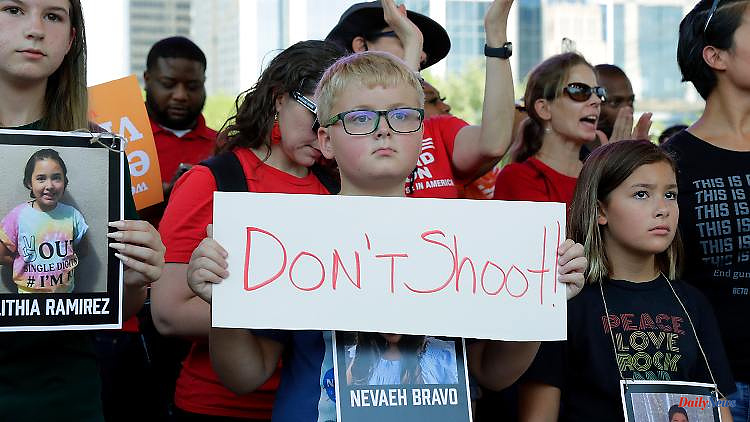The horror in the United States and elsewhere at the act that killed 19 elementary school children is great, and there are numerous calls for stricter gun laws. But what will probably happen in the end: nothing. It's not just about lobbyists and the political system.
Within ten days, 31 people died in two horrific acts in the United States, including 19 children at an elementary school in Uvalde, Texas. "They died like on a battlefield, my God," said US President Joe Biden, shocked after the massacre in the gun-friendly state. "Losing a child is like having a piece of your soul ripped out." Biden knows what he's talking about, he himself lost his son Beau a few years ago. The President says he will pray for the family. "When are we going to stand up to the gun lobby? When in God's name are we going to do what we all know and feel needs to be done?"
Biden is exaggerating when he says “everyone”; according to a MorningConsult survey, 65 percent of US citizens are in favor of greater restrictions on gun ownership, but yes: there is a clear majority for generally stricter handling. Only 28 percent are against it. Nevertheless, it is clear to the USA and everyone who is concerned that even after these 31 dead people, nothing or almost nothing will change, especially not through prayer, those typical "thoughts and prayers" as a reaction to gun dramas. This has long become the code for inaction in gun law. If you don't want to do anything, you can simply announce that you want to pray.
A majority is also in favor of a ban on so-called assault weapons. It is semi-automatic weapons that Biden explicitly named because they bring the largest profit margins to the defense industry. The ruling Democrats in particular are in favor of stricter gun laws, while the Republicans are against them. But the majority and their political representatives are running up against a legislative wall in the US Senate. A 60 percent majority is required for such a project, but this is not in sight. Even if the Democrats did have it, there's a good chance that someone from their own ranks would torpedo the project in order to advance their own agenda in exchange for maximum dilution.
The National Rifle Organization (NRA) is one of the most powerful civilian organizations in the country, channeling the interests of gun owners and those who deem them necessary. It may have lost some of its influence in recent years and is no longer moving as much money as it did in 2016, when it paid around $54 million for the election campaign, primarily for future President Donald Trump. The gun lobby from the NRA and others then invested around 33 million dollars in the 2020 presidential election. One of the main goals: prevent stricter laws against gun owners.
The majority of donors to the NRA's Victory Fund campaign organization in 2019 were retirees. In the first survey in 2003 it was still 40 percent. In addition to skyrocketing court costs and allegations of corruption, the NRA's problems also include losing members. Therefore, according to the US trade magazine "The Reload", the NRA's premium income fell to $165.2 million last year, $19.4 million lower than the organization had expected. An NRA spokeswoman said that many problems had to do with the pandemic, but that the organization was stronger than ever: "We are promoting the constitutional right to bear arms, the gold standard of self-defense." At the annual meeting, several Republicans are handing the microphone these days. Texas Senator Ted Cruz performed in Houston, as did former President Donald Trump. For them, owning a gun is a vehicle for political ends.
The NRA's activism has, in its own way, married gun owners to Republicans. In their positive perception, the gun owner is a concerned citizen in the best sense of the word, defending himself, his family and defenseless fellow human beings against the dangers out there. Who thereby exercises a constitutionally guaranteed right, which means the protection of life, not danger or death. The Republicans, and Trump in particular in recent years, have charged this nostalgic understanding of freedom with their anti-elite rhetoric. It feeds the feeling that city Democrats are ignorant of real American life outside of it, but still want to dictate how everyone else should live.
About a third of Americans own a firearm, a third would consider it, and a third completely exclude it. The gun bearers are predominantly male, white, Republican and live in rural areas. Most have multiple guns at home, the majority for security reasons. The Supreme Court ruled in 2008 that the Constitution guarantees this statewide, although laws on carrying guns outside of one's home vary widely across states. Ted Cruz, for example, recently smashed the Democrats' demands for stricter nationwide rules. The Democrats were trying to limit constitutional rights for law-abiding citizens.
From the perspective of progressive Democrats, the gun debate also highlights the flaws in the political system that the Senate uses to block progressive legislation. There, the sparsely populated, rural and predominantly Republican states are overrepresented. A state has two senators, whether it has 40 million people (California) or 600,000 (Wyoming). This representative imbalance was originally intended to protect the elites from the influence of the broad, uneducated populace, but also to protect rural interests from urban dominance. Many Republicans still see the latter this way today, and this is also reflected in election results. Roughly speaking, the Democrats tend to win in the cities and the Republicans tend to win in the countryside.
The imbalance in the Senate only becomes dramatic with the filibuster: an endless speech that anyone can give if they want to bring down a legislative project. It can only be ended with a 60 percent majority. There is always talk of changing the filibuster, but this would also require the 60 percent. So the cat bites its own tail, because why would anyone agree to curtail their own influence if they don't have to?
In addition, there is the conservative dominance of the Supreme Court, which has been cemented for the time being by the new appointments under Trump. The Supreme Court could soon expand gun owners' rights even further. The specific case is about carrying weapons in New York, which the plaintiffs believe should be allowed - after all, it is guaranteed by the constitution and the corresponding ban of the state is accordingly ineffective. A Supreme Court decision could set precedent for the entire United States. The United States is a paradise for gun fans even without such a verdict.
More than 45,000 people died from guns in the US in 2020; 54 percent of them by suicide, 43 percent were shot. The numbers are high by US standards, but not record high. In the 1970s, more people died from guns in the United States relative to the population than today. However, it is massacres like in Texas that become exclamation points for public debate. There have been more and more of them lately, and the number of single perpetrators with multiple victims has increased in recent years. The FBI counted three such cases in 2000, and 40 in 2020, more than ever before.
In recent years, anti-gun lobby groups have gained influence, which also has to do with greater financial expenditure. In 2020, they spent a record $23.5 million. But at the top of politics, they still do little because of the balance of power in the Senate and the systemic limits. So the Republicans are on the side of the gun owners, the Democrats are getting nowhere with their projects. President Biden, some say, could simply issue executive orders, or declare a public health emergency and take countermeasures, given the death toll from gun violence. In both cases, however, it would be easy to undo this. And the next election is only a few months away.












